SIP Press Area
The Societal Impact of Pain (SIP) Platform welcomes the interest of press in issues related to pain policy and advocacy. Please find below any recent press materials:
2025
From Burden to Prevention: SIP Event at the European Parliament Calls for Action to Embed Chronic Pain Prevention Across EU Policies
Press Statement
From Burden to Prevention: SIP Event at the European Parliament Calls for Action to Embed Chronic Pain Prevention Across EU Policies
Brussels, 16 October 2025 – The Societal Impact of Pain (SIP) platform today hosted “From Burden to Prevention: Reframing Chronic Pain in EU Health Policy” at the European Parliament (Room A3E-2), bringing together EU policymakers, researchers, clinicians, patient advocates, representatives from leading European health organisations, including the European Cancer Organisation (ECO) and the Europe Region World Physiotherapy (ERWCPT), the World Health Organization (WHO), as well as speakers from the World Rehabiliation Alliance (WRA/WHO). The event explored how Europe can scale up prevention for one of its most prevalent and costly health challenges.
Hosted by MEP Motreanu, MEP Andriukaitis, MEP Sokol and MEP Pietikäinen, the event highlighted that chronic pain—pain lasting more than three months—is the most common health condition in Europe and a major driver of disability. Its impact extends well beyond physical symptoms, reducing quality of life, limiting participation in work and society, and increasing risks of mental ill-health and social isolation. The economic burden is substantial, estimated at €12 billion annually (≈4% of GDP), driven by healthcare use, lost productivity, and long-term work absence.
Discussions underscored that chronic pain remains under-recognised in policy, underfunded in research, and poorly addressed in care pathways. Most treatments provide short-term relief and do not prevent chronification or disability. Speakers stressed that prevention is essential—both early intervention to stop acute pain becoming chronic and ongoing support to protect function in people already living with chronic pain.
SIP presented its Position Statement on Preventive Healthcare for Chronic Pain and called on EU and national policymakers to act across eight priority areas:
- Improve pain-related health literacy through public health campaigns.
- Promote structured exercise and education in clinical and workplace settings to reduce risk and recurrence.
- Adopt evidence-based standards for acute and chronic pain management to curb low-value care.
- Ensure early access to biopsychosocial rehabilitation for people at risk—especially those with depression, low recovery expectations, or socio-economic disadvantage.
- Support inclusive employment policies and workplace adaptations to promote return-to-work and job retention.
- Foster cross-sector collaboration between health, mental health, education, and social protection systems.
- Strengthen primary care for timely diagnosis, coordination, and follow-up.
- Fund prevention-focused research, including mechanisms, interventions, implementation, and patient-driven solutions.
Quotes
Patrice Forget; SIP Chair; EFIC Advocacy Committee Chair; European Pain Federation EFIC: “This year’s European Day on Pain Awareness marks a pivotal shift from managing pain to proactively preventing it. By convening researchers, clinicians, patient advocates, and policymakers, we are strengthening the foundation for evidence-based strategies that reduce the burden of pain, before it begins, or its consequences when having to live with. The continued support for this initiative can only encourage us to prioritise prevention, equity, and innovation in pain care.”
Liisa Jutila; SIP Co-Chair; Pain Alliance Europe PAE: “From a patient perspective, pain and prevention must be seen as inseparable parts of health policy. Preventing pain before it becomes chronic is not only a medical goal but a way to protect quality of life and social participation. Pain prevention reduces not only suffering but also long-term health care costs.”
Joanne O’Brien Kelly; EFIC Advocacy Committee Co-Chair; European Pain Federation EFIC: “The European Pain Federation event in the European Parliament on October 16th marks a pivotal moment in reshaping how chronic pain is acknowledged and addressed across Europe. We urge EU policymakers to prioritise early intervention, public awareness and integrated approaches to addressing chronic pain, shifting the focus to prevention. This event calls for coordinated action across health, employment and research sectors to work together to reduce the personal and societal burden of chronic pain. With a strong emphasis on education, prevention programmes and policy reform this event recognises that chronic pain presents public health and social challenges that demand systemic change.”
Nadia Malliou; President; Pain Alliance Europe PAE: “As patients, we know what happens when prevention is not in place. We know the frustration of delayed diagnosis — sometimes for years. We know the discouragement when care pathways are fragmented and the despair when the only solutions offered are temporary, or ineffective. Prevention is a call to action — to build systems that are proactive, equitable, and person-centred. It is not only medical, but also societal, economic, cultural and sometimes even political.”
The event concluded with a clear call to action: integrate chronic pain prevention into EU and national health, employment and research strategies, ensuring coordinated implementation in the current and next EU mandate.
– ENDS –
Note for Editors: The Societal Impact of Pain (SIP) platform is a multi-stakeholder initiative led by the European Pain Federation EFIC and Pain Alliance Europe (PAE). SIP aims to raise awareness about the impact of pain and drive policy changes to improve pain management across Europe. The scientific framework of SIP is under the responsibility of EFIC and the strategic direction is co-defined by EFIC and PAE.
Contact:
Ángela Cano Palomares, Societal Impact of Pain (SIP) Europe / European Pain Federation EFIC
angela.palomares@efic.org




SIP Session: Pain and Mental Health: Can Healthcare Professionals and Patients Have a Societal Impact?
Press Statement
Press Statement: SIP Session: Pain and Mental Health: Can Healthcare Professionals and Patients Have a Societal Impact?
Lyon, 26th April 2025 – The Societal Impact of Pain (SIP) Platform successfully hosted a session titled “Pain and Mental Health: Can Healthcare Professionals and Patients Have a Societal Impact?” during the EFIC Congress 2025 in Lyon. The session brought together healthcare professionals, patient representatives, and policy advocates to explore the dual relationship between pain and mental health and how both communities can influence change at the societal level.
Patrice Forget, Chair of the EFIC Advocacy Committee, SIP Chair, and Moderator of the Session, opened the discussion by welcoming participants and outlining its objectives. He provided an overview of the Societal Impact of Pain (SIP) Platform and Pain Alliance Europe (PAE), framing the debate within broader efforts to integrate pain and mental health into European policy strategies.
Lars Bye-Møller, Health Science International Relations Lead at FAKS, shared powerful personal insights into the lived experience of chronic pain. He highlighted its complex nature and underscored the relevance of the biopsychosocial model of pain. Key issues such as the need for interdisciplinary collaboration, the legitimacy of psychosomatic pain, healthcare inequalities, and the vital role of patient empowerment were brought to the fore.
Katy Antonopoulou, PAE Board Member, echoed these themes, offering her perspective on living with chronic pain. She reflected on the implications of ICD-11, noting the significant shift in recognising pain not merely as a symptom but as a disease in its own right.
Marta Bartnicka, EFIC/SIP Advocacy Projects Officer, introduced SIP’s ongoing policy work at the intersection of pain and mental health. She presented the SIP Joint Statement on Mental Health, the 27 amendments proposed to the European Parliament’s Mental Health Report, and outlined the broader strategy to ensure pain is appropriately recognised and addressed within European mental health frameworks.
The session continued with a dynamic discussion, moderated by Patrice Forget, which welcomed contributions from healthcare professionals and patient representatives in the audience. The exchange emphasised the pressing need for integrated care models, cross-sector collaboration, and stronger patient involvement in shaping healthcare systems.
Katy Antonopoulou concluded the session by summarising the key messages and reaffirming SIP’s commitment, together with its national platforms, to influencing policy and practice across Europe. Her closing remarks called for the development of robust, patient-centred approaches that effectively bridge pain and mental health, and for sustained collaborative action to support those affected by chronic pain.
The session reaffirmed SIP’s core mission: to drive change by uniting the voices of patients and professionals. The key message was clear—by building bridges across disciplines and sectors, we can make a meaningful societal impact.
– ENDS –
Note for Editors:
The Societal Impact of Pain (SIP) platform is a multi-stakeholder initiative led by the European Pain Federation EFIC and Pain Alliance Europe (PAE). SIP aims to raise awareness about the impact of pain and drive policy changes to improve pain management across Europe. The platform is supported by its scientific partner EFIC, with strategic direction co-defined by both EFIC and PAE.
For more information, please contact:
Ángela Cano Palomares, Societal Impact of Pain (SIP) Europe / European Pain Federation EFIC – angela.palomares@efic.org
Event Materials:
- Please find the Slides here.
- Please find some of the photos below:
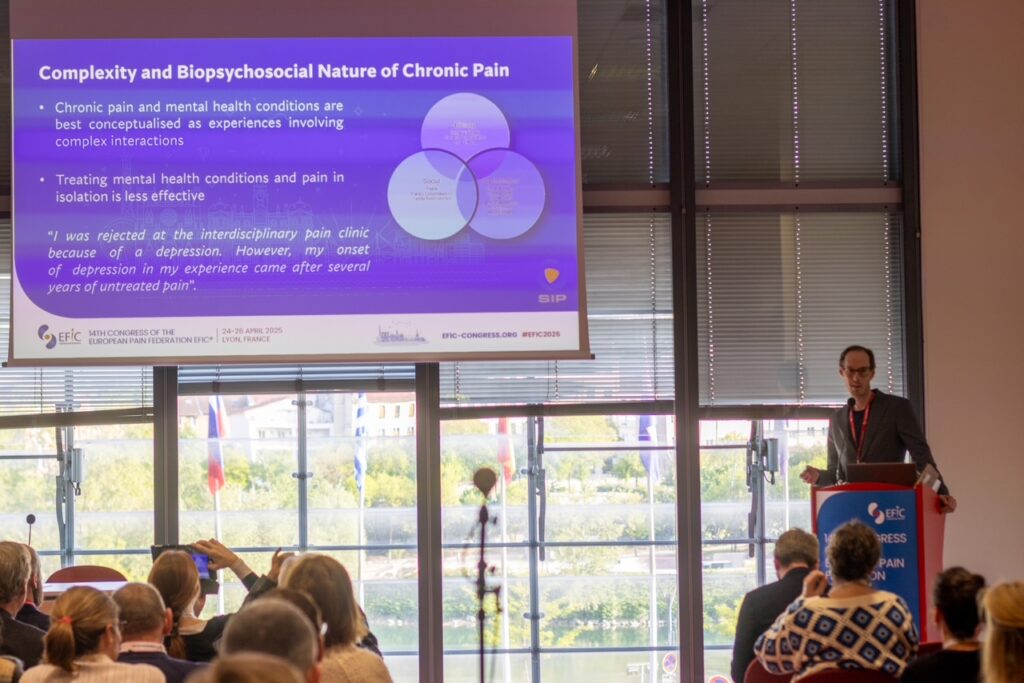


2024
Pain Treatment, Management and Prevention – Is Europe Providing Adequate Access? 16 October 2024 at Fondation Universitaire
Press Statement
Press Statement: Successful Event on Pain Treatment, Management, and Prevention Highlights Urgent Need for Improved Access in Europe
Brussels, 16th October 2024 – The Societal Impact of Pain (SIP) Platform successfully hosted its event, ‘Pain Treatment, Management and Prevention – Is Europe Providing Adequate Access?’ bringing together leading policymakers, pain specialists, and patient representatives. Held in Brussels, the event provided a critical forum for addressing the current state of pain management and accessibility across Europe.
The discussions emphasised key barriers to accessing pain treatment, including shortages of essential medicines inconsistencies in the implementation of comprehensive pain care across member states, and technical barriers linked to European regulations. Participants engaged in productive dialogues about the importance of fully adopting ICD-11 to ensure proper recognition and treatment of chronic pain. The event highlighted the need for urgent action by policymakers to prioritise pain management within healthcare systems.
Prominent figures from the European Parliament (MEPs), such as the event hosts MEP Alex Agius Saliba and MEP András Tivadar Kulja, as well as MEP Vytenis Povilas Andriukaitis and MEP Tomislav Sokol, alongside leading healthcare professionals, reviewed pivotal documents such as the SIP Book of Evidence and the EFIC Multimodal Pain Treatment Position Paper. These resources, aimed at guiding future policy decisions, were well received by participants and underscore the importance of adopting multimodal approaches and patient-centred strategies in addressing chronic pain.
The event also marked the introduction of the European Day on Pain Awareness, set to be observed annually on the third Wednesday of October. This new initiative aims to foster increased understanding of chronic pain, reduce stigma, and advocate for necessary policy changes to improve care. The announcement was met with strong support from attendees, who acknowledged the significant impact of chronic pain on individuals and societies across Europe.
The event concluded with a clear call to action: EU and national governments must recognize the burden of pain and implement more effective policies that guarantee access to high-quality pain management. An event report summarizing the discussions and proposed next steps will be disseminated to guide future initiatives across Europe.
Luis García-Larrea, President of EFIC, said, “This event has underscored the urgent need for coordinated, multidisciplinary approaches to pain management in Europe. We are hopeful that the discussions here today will lead to tangible improvements in access to pain care, as well as pain research.”
Liisa Jutila, PAE Board Member; SIP Co-Chair and Moderator of the Event, noted, “Chronic pain impacts millions across Europe, and this event has made it clear that more must be done to support those affected. The patient views shared today are a reminder of why we must continue to push for improved access to care.”
Joanne O’Brien Kelly, EFIC Advocacy Committee Co-Chair and Moderator of the Event added, “Today’s discussions have shown that effective pain management is key to ensure equitable and safe access to treatment. We must continue to push for policy frameworks that ensure chronic pain is recognised, treated, and prioritised across Europe. This event marks a pivotal moment in advancing these efforts.”
Patrice Forget, EFIC Advocacy Committee Chair and Chair of SIP: “By bringing together a diverse group of experts and policymakers, we have taken a significant step forward in addressing the barriers to effective pain management. The support for the European Day on Pain Awareness is a testament to the growing recognition of the importance of this issue.”
Nadia Malliou, PAE Treasurer and Board Member: “The discussions held today remind us that behind every statistic on chronic pain, there is a person suffering and has a wide set of needs, individual and societal. Our goal is to create systems that respond to these needs with empathy, science, and efficiency”.
– ENDS –
Note for Editors:
The Societal Impact of Pain (SIP) platform is a multi-stakeholder initiative led by the European Pain Federation EFIC and Pain Alliance Europe (PAE). SIP aims to raise awareness about the impact of pain and drive policy changes to improve pain management across Europe. The platform is supported by its scientific partner EFIC, with strategic direction co-defined by both EFIC and PAE.
For more information, please contact:
Ángela Cano Palomares, Societal Impact of Pain (SIP) Europe/ European Pain Federation EFIC – angela.palomares@efic.org
Event Materials:
- Please find the Agenda here.
- Please find the Slides here.
- Please find the Event Report here.
- Please find the Video Report here.
- Please find the MEPs and Experts quotes below:
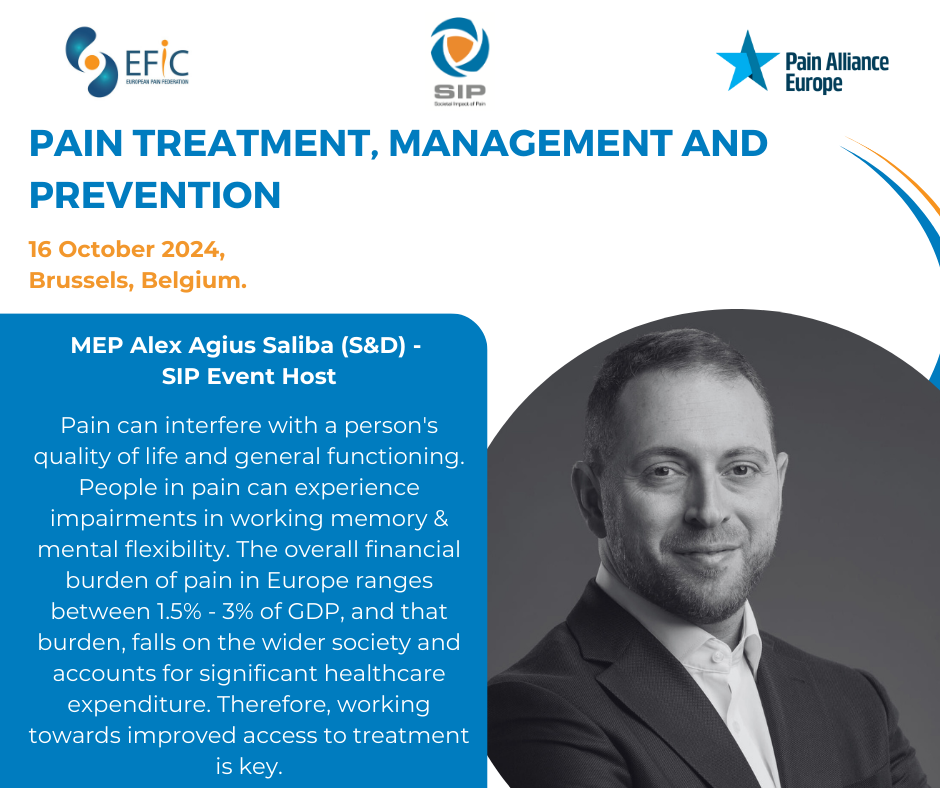
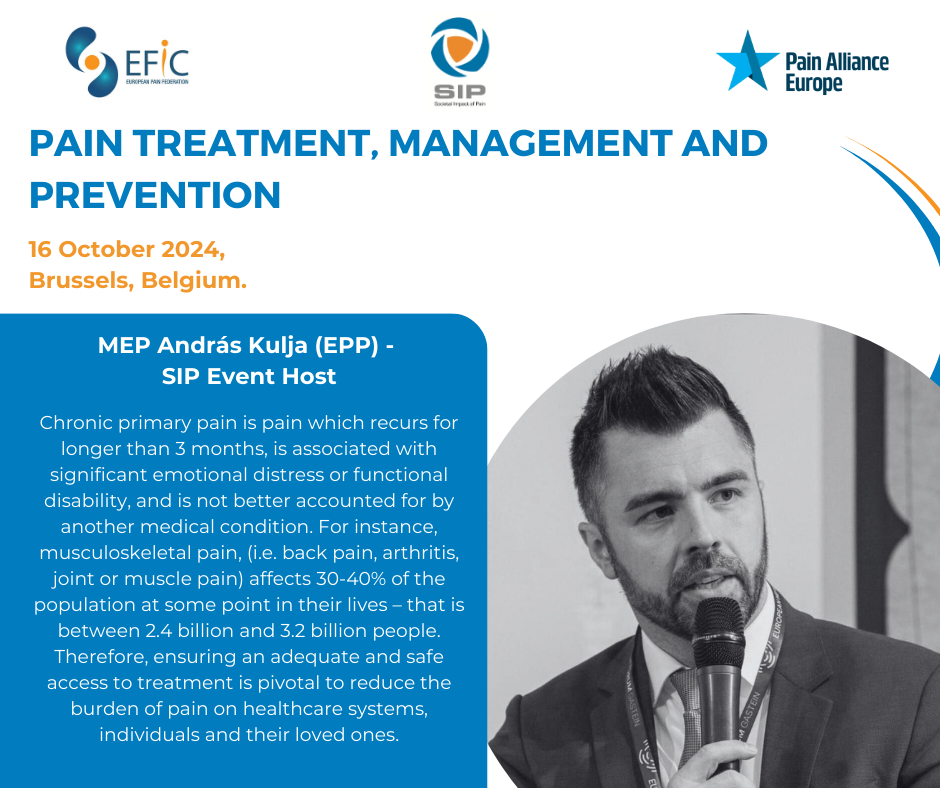
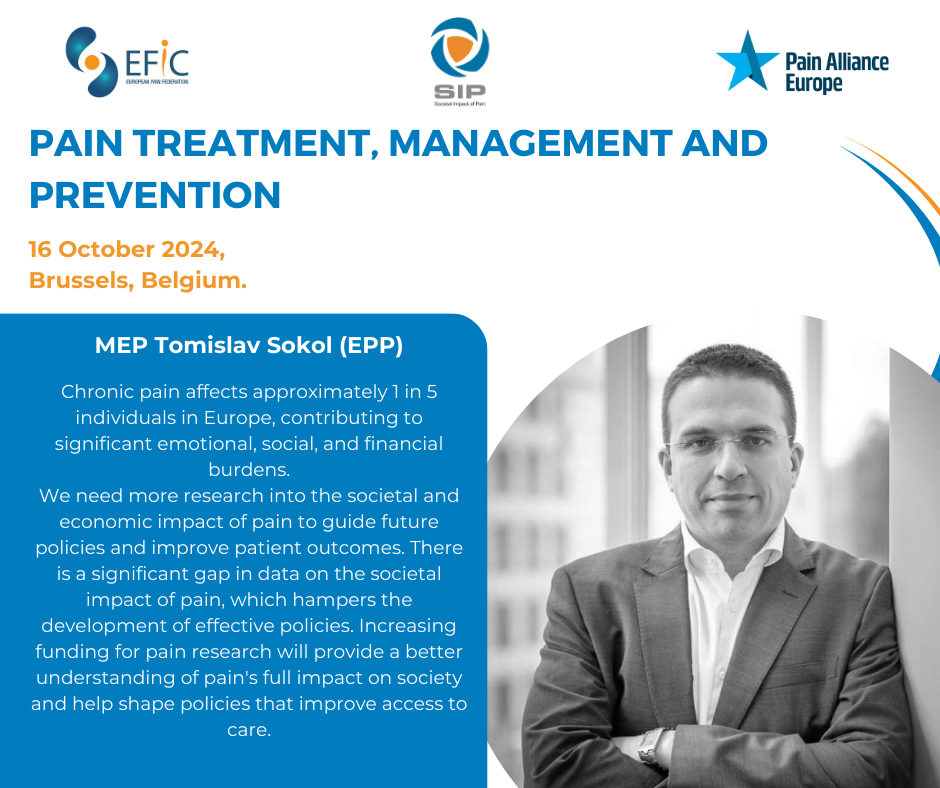
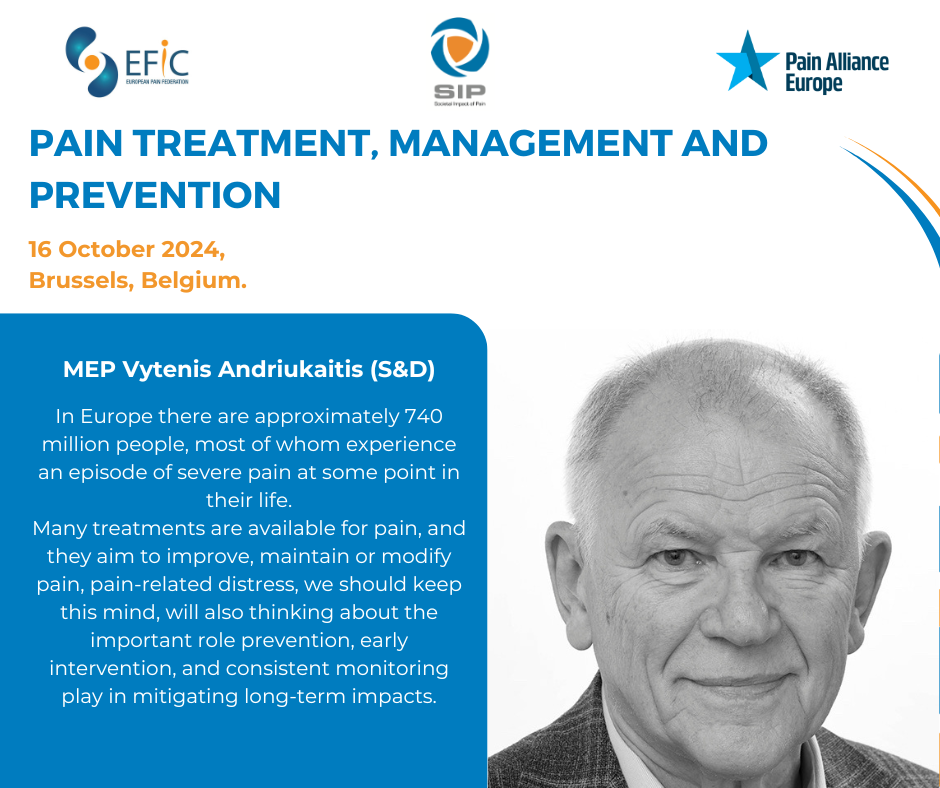
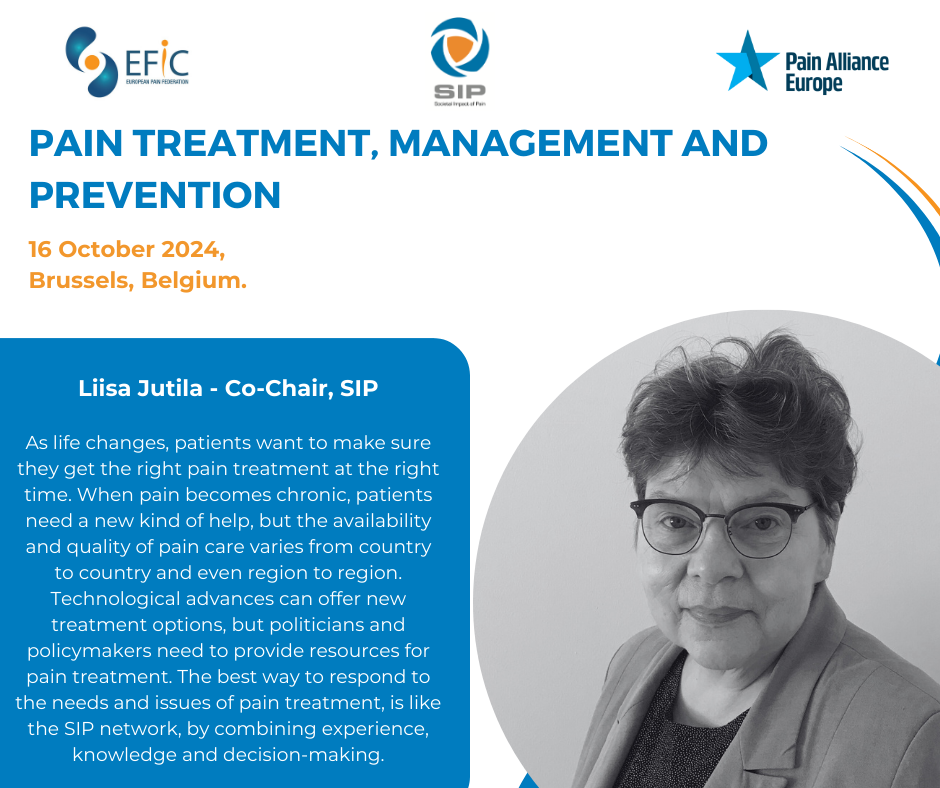
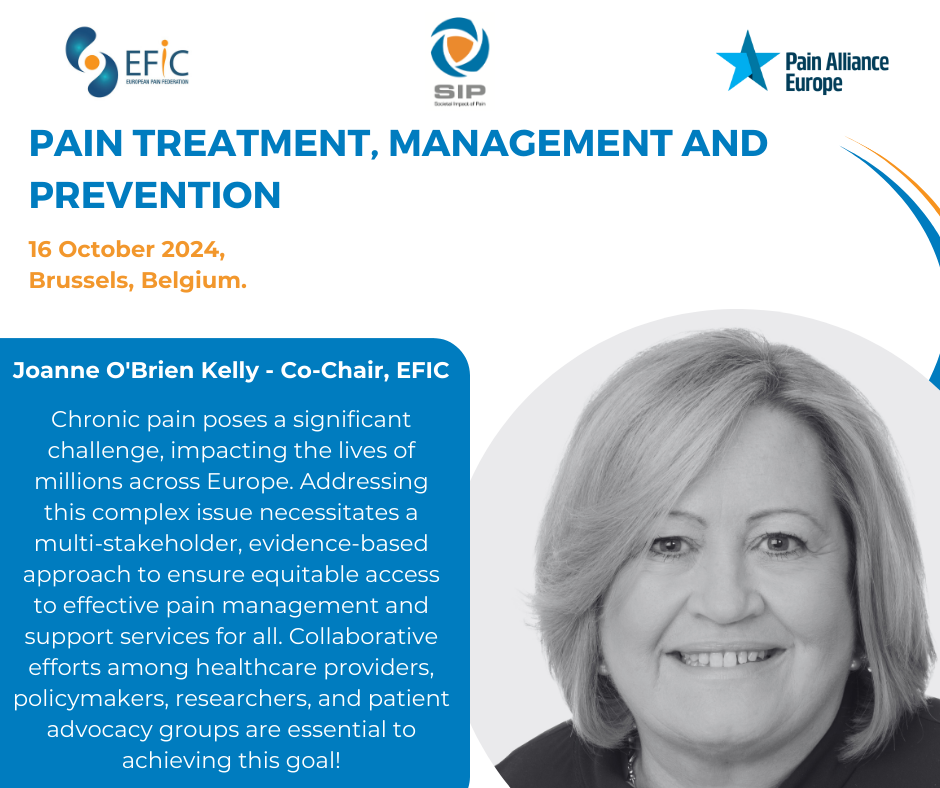
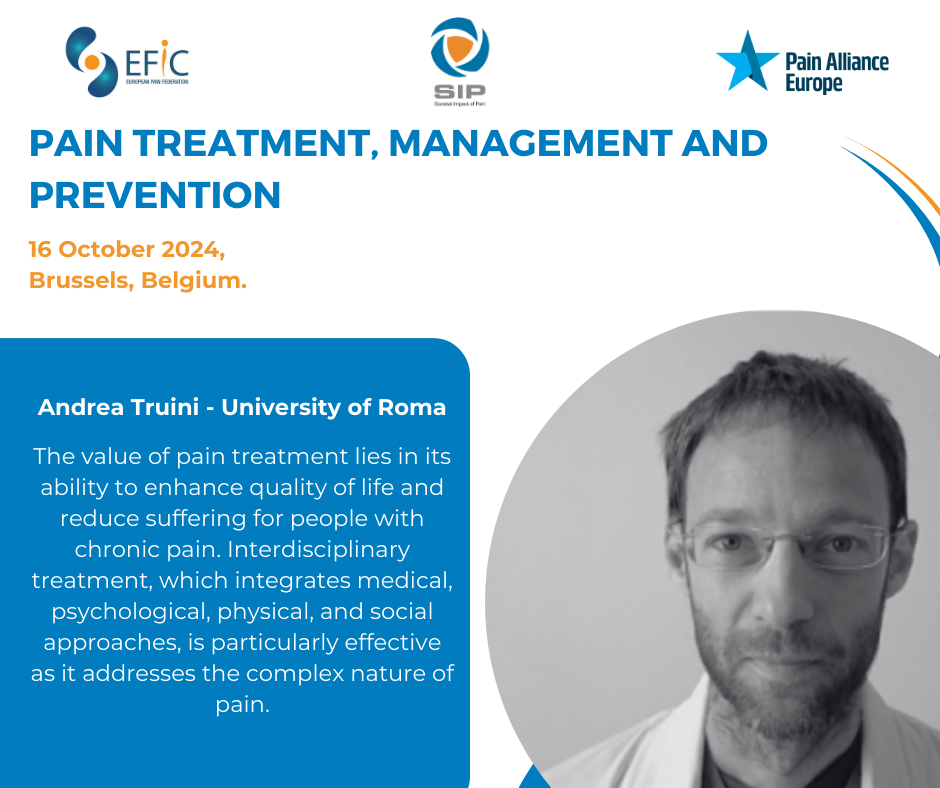
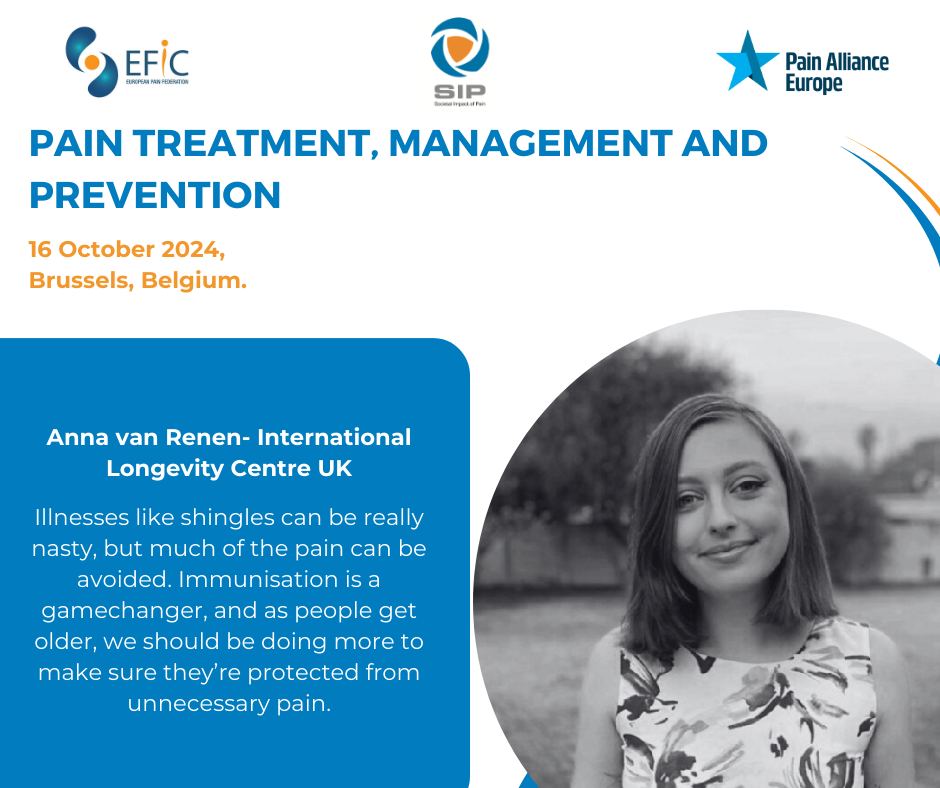
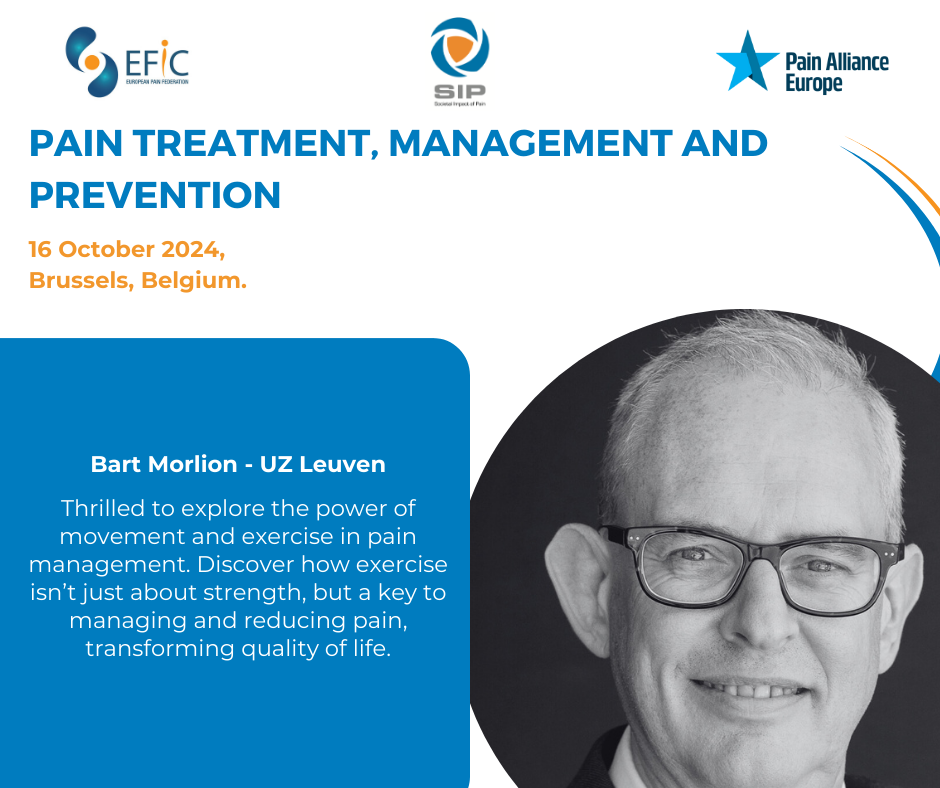
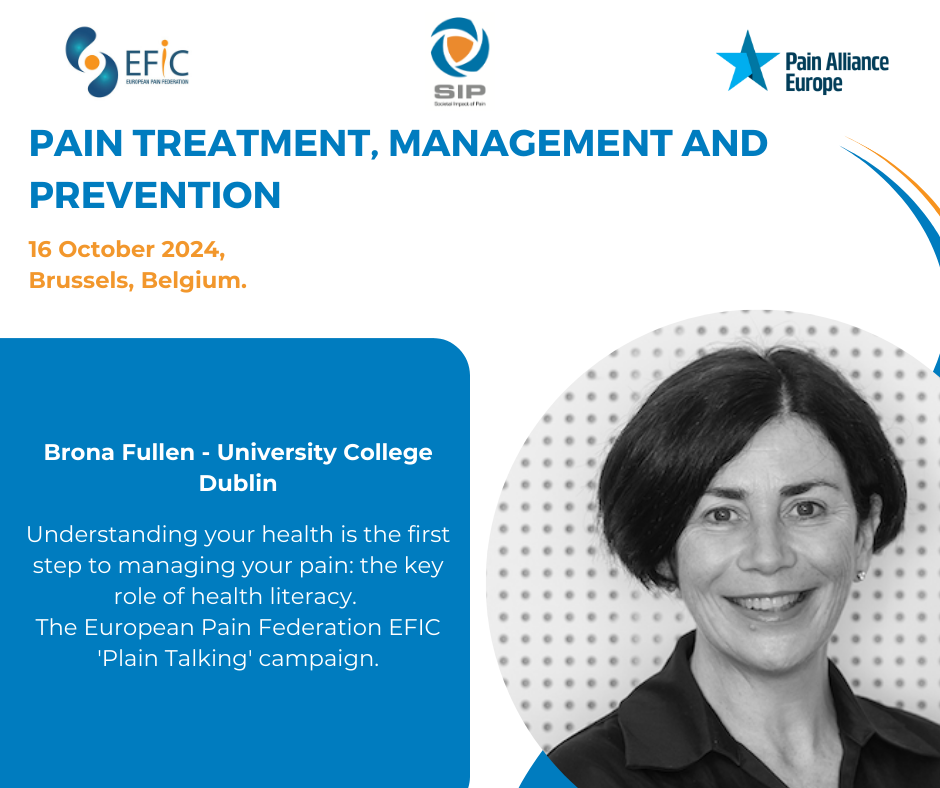
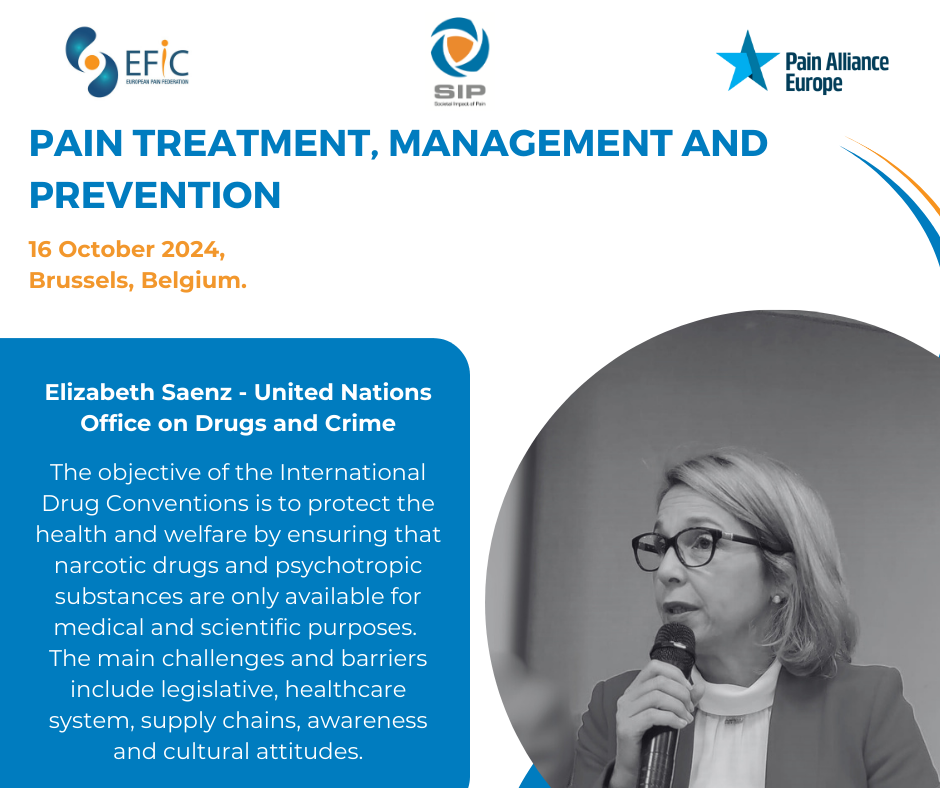
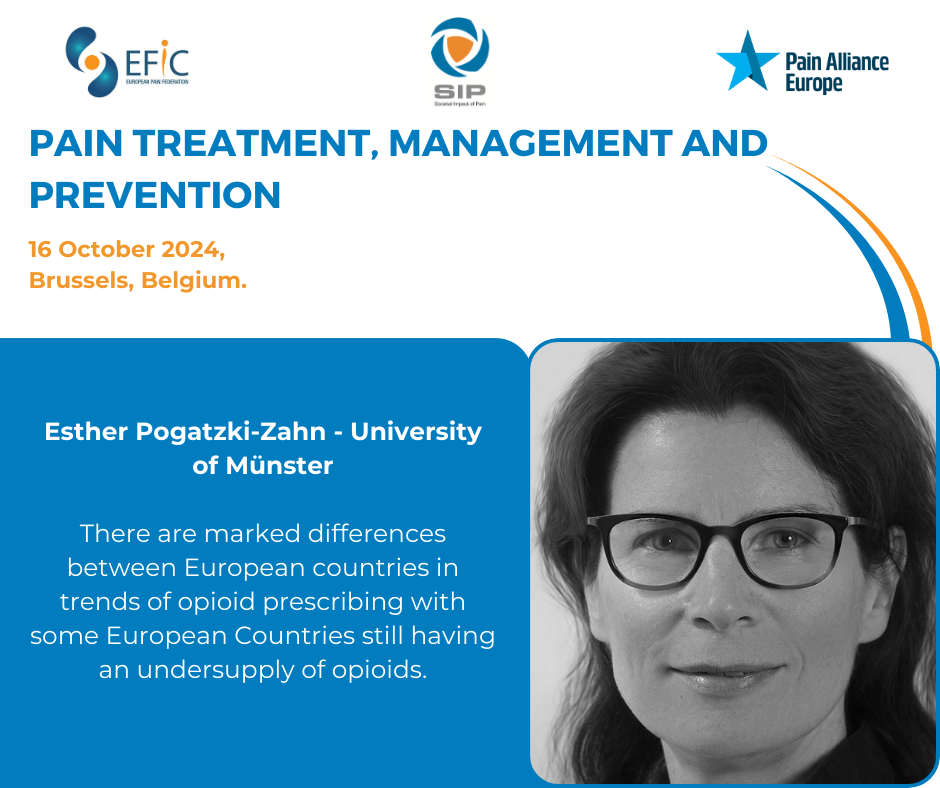
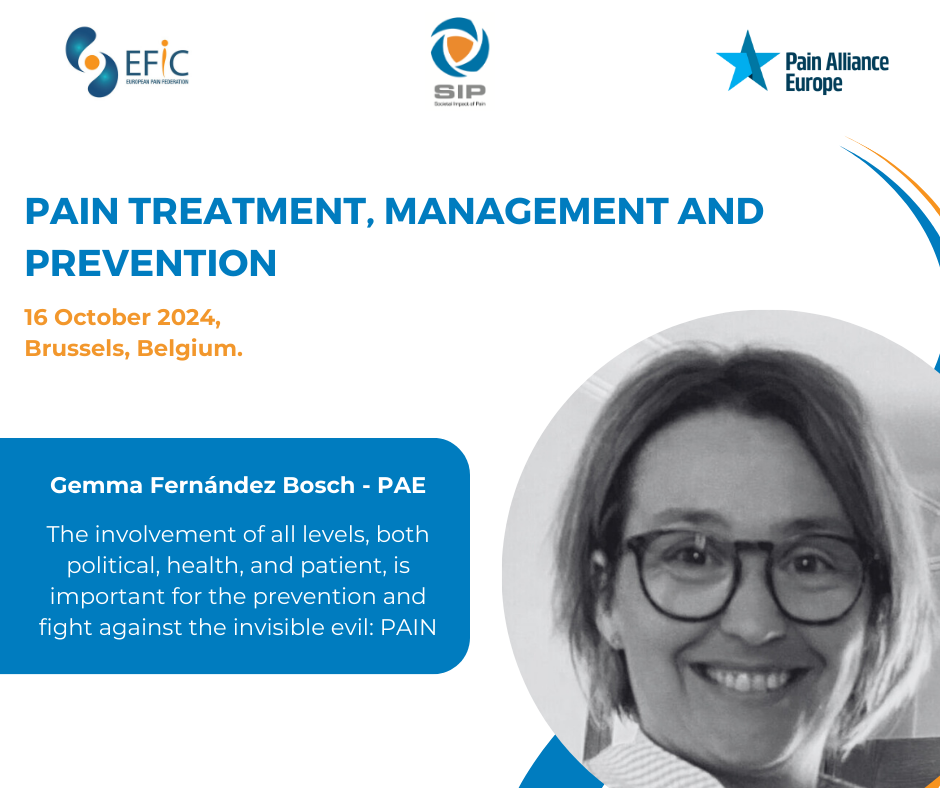
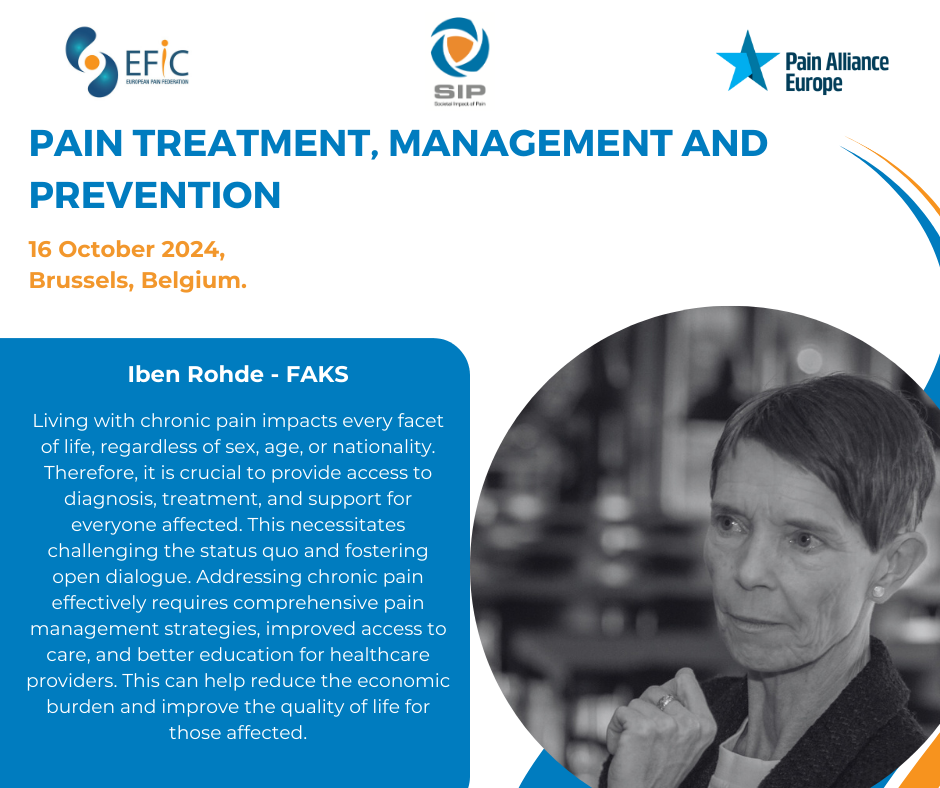
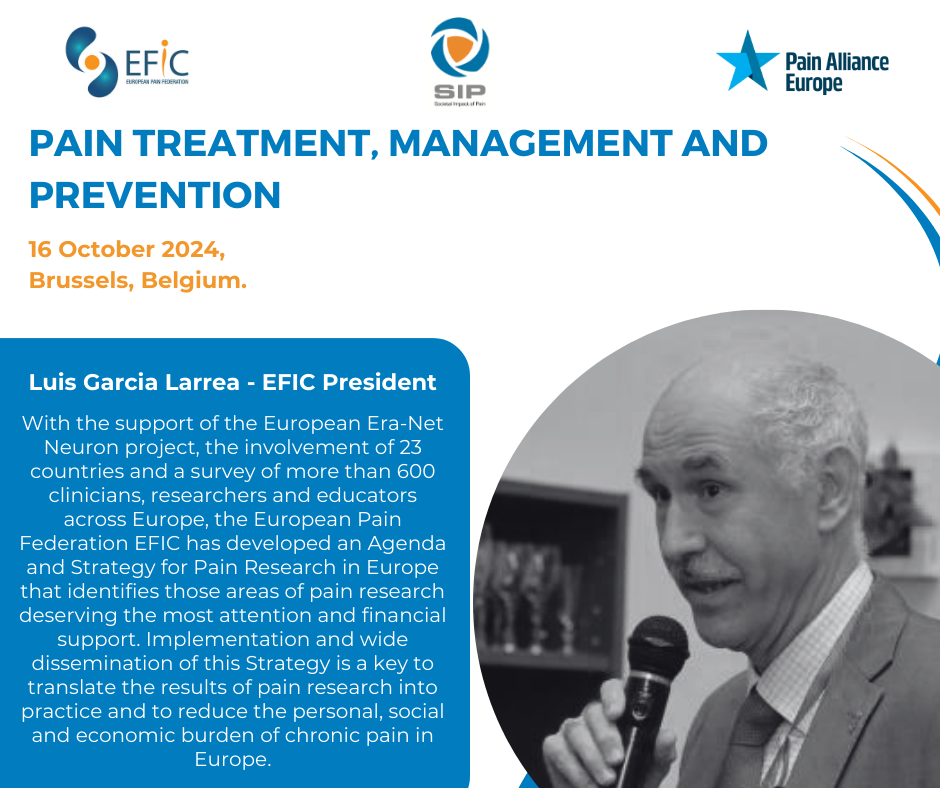
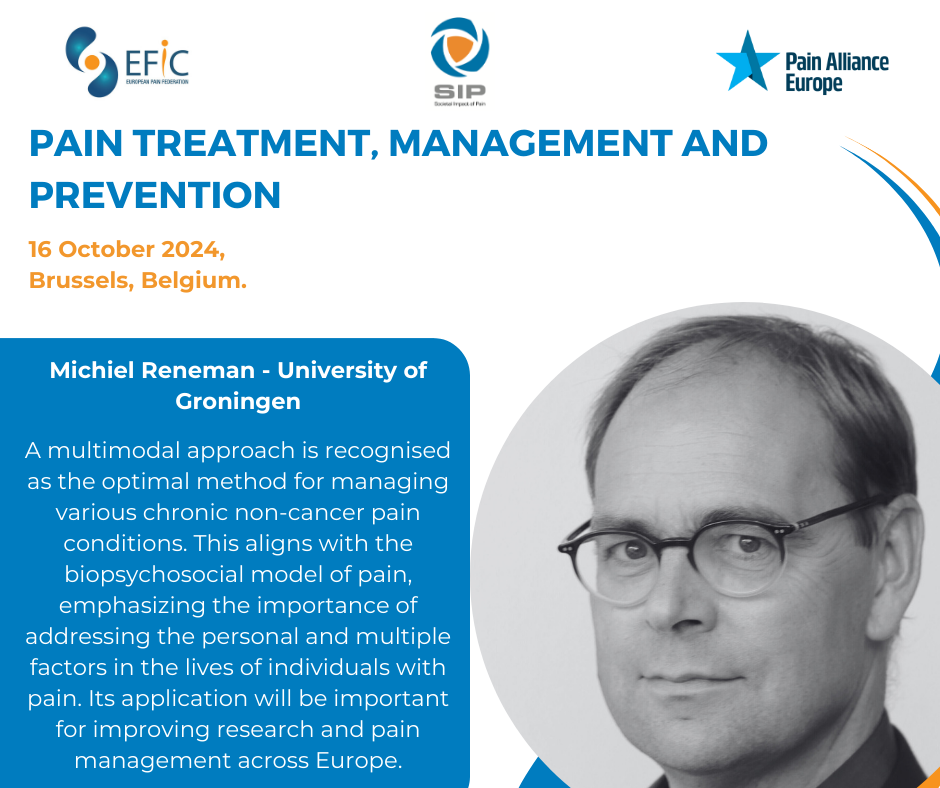
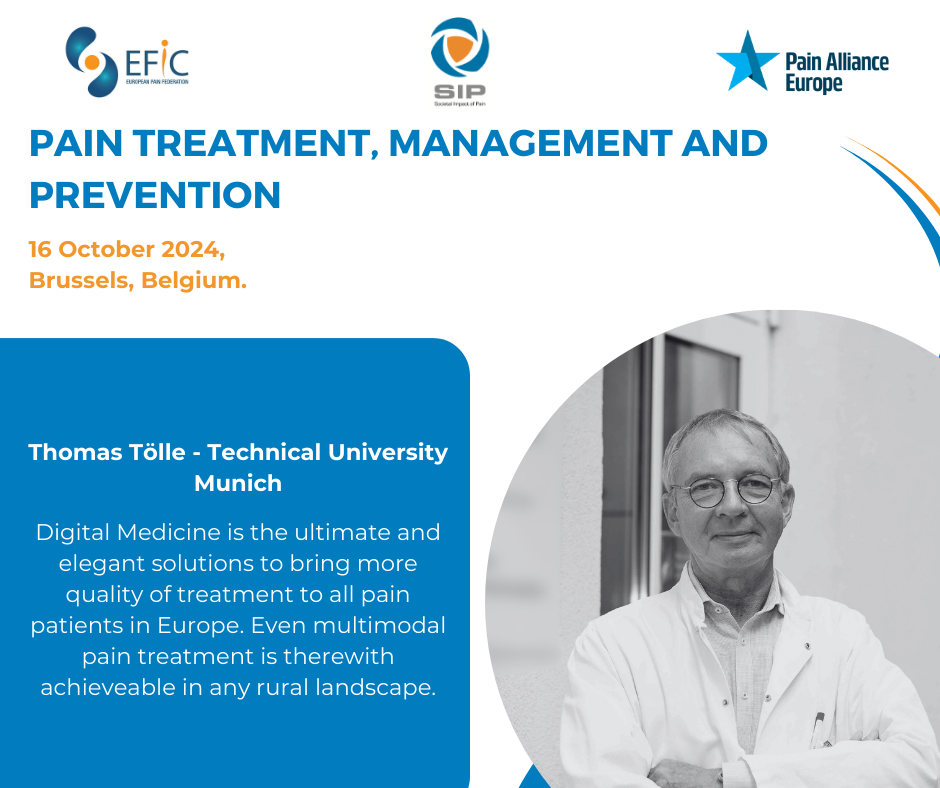
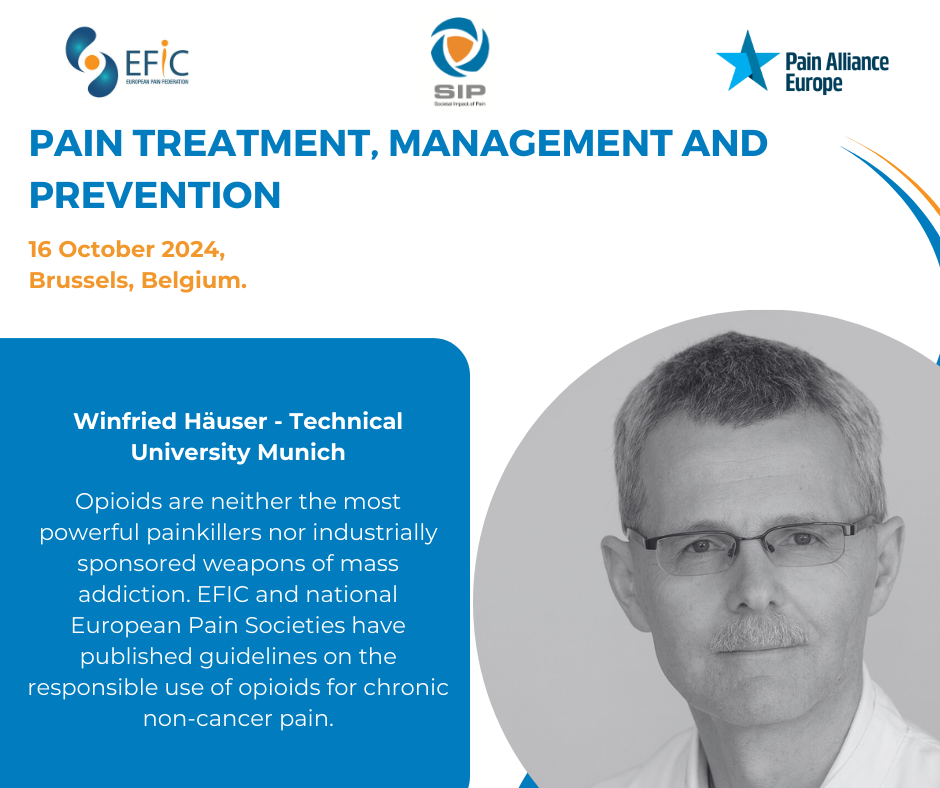
SIP Statement on the launch of the European Commission Political Guidelines 2024-2029
Press Statement
SIP Statement on the launch of the European Commission Political Guidelines 2024-2029
The Societal Impact of Pain (SIP) Platform welcomes the launch by the European Commission of the Political Guidelines for the 2024-2029 term.
Brussels, 23rd July 2024 –The Societal Impact of Pain (SIP) Platform welcomes the launch by the European Commission of the Political Guidelines for the 2024-2029 term. SIP is delighted to see such an ambitious plan, particularly in the area of health. The emphasis made with regards to health, more specifically, on the shortages of medical devices and medicines, with antibiotics, insulin, painkillers, and other products which are becoming increasingly difficult to obtain, is of particular relevance and importance. Further, the focus placed on other highly relevant topics, such as mental health, good working conditions, improved access to advanced treatments and education, amongst others, is too of the utmost importance.
Pain is a multifaceted matter and a broader dialogue involving healthcare professionals, policymakers, and patient advocacy groups could significantly contribute to a more effective pain management strategy across Europe, and SIP is here to support the European Commission if required.
Luis García-Larrea, President of EFIC
Patrice Forget, Chair of SIP
Nadia Malliou, PAE Treasurer and Board Member
-ENDS-
Note for Editors:
The ‘Societal Impact of Pain’ (SIP) platform is a multi-stakeholder partnership led by the European Pain Federation EFIC and Pain Alliance Europe (PAE), which aims to raise awareness of pain and change pain policies. The scientific framework of the SIP platform is under the responsibility of EFIC and the strategic direction of the project is defined by both partners.
For more information, please contact:
Ángela Cano Palomares, Societal Impact of Pain (SIP) Europe/ European Pain Federation EFIC – angela.palomares@efic.org
SIP Statement on the launch of ‘The Burden of Pain: A Societal Impact of Pain (SIP) Book of Evidence’
Press Statement
SIP Statement on the launch of ‘The Burden of Pain: A Societal Impact of Pain (SIP) Book of Evidence’
Brussels, 08.05.2024 – The Societal Impact of Pain (SIP) Platform is delighted to announce the launch of ‘The Burden of Pain: A Societal Impact of Pain (SIP) Book of Evidence’.
‘The Burden of Pain: A Societal Impact of Pain (SIP) Book of Evidence’ was created for individuals from a non-scientific background to gain an insight into what pain is, understand different definitions used (e.g. acute pain, neuropathic pain, nociceptive pain), and the debilitating effects pain has on patients and societies. Further, the document proceeds to unveil a series of patient testimonies, each sharing their journey dealing with different types of pain and articulating their lived experiences. The Societal Impact of Pain (SIP) hopes, via these examples of common pain types and testimonies, to offer an understanding of the diversity and commonalties within pain. While pain conditions vary in their pathology and how they are experienced, one factor that often unifies them is the lack of attention given to them within the healthcare system and within policy frameworks. The Societal Impact of Pain (SIP) aims to change this by raising awareness of pain and by changing pain policies. Thus, the Societal Impact of Pain (SIP) calls upon national policymakers to recognise the burden and impact of pain on societies and patients, and increase its priority within healthcare systems, funding and policymaking.
If you would like to know more about the topic, please consult and download the document here.
Luis Garcia-Larrea, EFIC President
Deirdre Ryan, PAE President and SIP Co-Chair
Patrice Forget, SIP Chair
-QUOTES-
Nadia Malliou, PAE Board Member: “This Book of Evidence is filled with useful information, using simple terms for everyone to gain knowledge and awareness of what pain is, how it impacts our lives and gain some insight of how it actually is to live with it, reading real life testimonies. The impact of pain is tremendous and this is a useful tool to build bridges and break down barriers.”
Patrice Forget, SIP Chair: “Pain is something we all think about, and some of us experience it severely. It is our duty to improve our knowledge on this subject, in order to take advantage of what we can do to support people and society when they struggle. And, together, with this Book of Evidence, we can do a lot!”
-ENDS-
Note for Editors:
The ‘Societal Impact of Pain’ (SIP) platform is a multi-stakeholder partnership led by the European Pain Federation EFIC and Pain Alliance Europe (PAE), which aims to raise awareness of pain and change pain policies. The scientific framework of the SIP platform is under the responsibility of EFIC and the strategic direction of the project is defined by both partners.
For more information, please contact:
Ángela Cano Palomares, Societal Impact of Pain (SIP) Europe/ European Pain Federation EFIC – angela.palomares@efic.org
SIP Statement on the European Health Data Space Regulation
Press Statement
SIP Statement on the European Health Data Space Regulation
The Societal Impact of Pain (SIP) Platform welcomes the inclusion of the International Classification of Diseases (ICD) in the European Health Data Space (EHDS) Regulation.
Brussels, 3 May 2024 –The Societal Impact of Pain (SIP) Platform welcomes the political agreement reached between the European Parliament and the Council of the EU on the European Health Data Space (EHDS) Regulation, as well as the inclusion of ‘International Classification Coding’ Systems for Diseases, as part of ‘Annex 1; Main characteristics of priority categories of personal electronic health data for primary use; Patient Summary’.
This is a step in the right direction and will hopefully be interpreted in a way in which ICD is the main point of reference with regards to disease coding systems. The World Health Organization (WHO) International Classification of Diseases is the primary classification system for such a purpose and SIP looks forward to technical implementation confirming this will be used. ICD-11, can help capture and code chronic pain diagnoses, paving the way to better recognition, management, education and research in the field. Until now, many pain patients have not received an adequate explanation for their pain symptoms and those living with chronic pain have often suffered from stigma. ICD-11 has new diagnoses for chronic pain that should give many pain patients confidence and validate the cause of their pain for their families, employers, and national authorities.
The European Parliament approved the EHDS on 24th April and the Council of the European Union will do so after the summer break.
If you would like to know more about the topic, please read our Report here.
Luis Garcia-Larrea, President of EFIC
Patrice Forget, Chair of SIP
Deirdre Ryan, President of PAE and Co-Chair of SIP
Note for Editors:
The ‘Societal Impact of Pain’ (SIP) platform is a multi-stakeholder partnership led by the European Pain Federation EFIC and Pain Alliance Europe (PAE), which aims to raise awareness of pain and change pain policies. The scientific framework of the SIP platform is under the responsibility of EFIC and the strategic direction of the project is defined by both partners.
For more information, please contact:
Ángela Cano Palomares, Societal Impact of Pain (SIP) Europe/ European Pain Federation EFIC – angela.palomares@efic.org
2023
Pain and Mental Health: A Societal Impact of Pain (SIP) Event – 10 October 2023 at the European Parliament
Press Statement
- At present, 150 million people are experiencing chronic pain across Europe, approximately equal to the population of France and Germany combined
- Recognising and addressing pain in mental health settings and policies are essential to meet the needs of people with both pain and mental health conditions
- SIP has published a Joint Statement including nine recommendations that call upon EU and national policy makers to ensure a range of aspects related to pain and mental health are acknowledged in health policy
Brussels, 11 October 2023 – On 10 October 2023, experts were invited to share their insights at a panel discussion on “Pain and Mental Health: A Societal Impact of Pain (SIP) Event” hosted by MEP Marianne Vind and MEP Tomislav Sokol and attended by representatives from Pain Alliance Europe, the European Psychiatric Association, the European Federation of Neurological Associations, the Europe Region World Physiotherapy, the European Cancer Organisation and the Global Alliance of Mental Health Illness Advocacy Networks. During the event, experts explored the close relationship between pain and mental health, the quality of and access to safe pain management, the link between pain, mental health and employment, and how can all be integrated into mental health policies. Additionally, different EU Stakeholders shed a light on topics such as inclusion, inequalities, stigma, mental health and physical activity, and mental health in minority groups.
In Europe there are approximately 740 million people, most of whom experience an episode of severe pain at some point in their life. For approximately 20 percent, that pain persists for longer than three months and will be chronic pain. Therefore, at present, 150 million people are experiencing chronic pain across Europe, approximately equal to the population of France and Germany combined. Chronic pain is more prevalent in women than in men, with some estimates suggesting that women are twice as likely to experience chronic pain as men.
Mental health conditions and chronic pain frequently co-occur and influence each other, creating a vicious cycle of disability. Both pain and mental health conditions cause reduced quality of life, mobility and social participation across the lifespan. When treated in isolation, the treatment of mental health conditions is less successful if patients also have chronic pain, and the treatment of chronic pain is less successful if patients also have a mental health condition. Unfortunately, pain is not routinely assessed or addressed in people with mental health conditions. At the same time, mental health conditions like depression are often underrecognised and thus undertreated in people with chronic pain.
Recognising and addressing pain in mental health settings and policies are essential to optimise meeting the needs of people with both pain and mental health conditions. Under the umbrella of the Societal Impact of Pain (SIP) Platform, a gathering of ten European professional and patient organisations have developed a Joint Statement on the close link between pain and mental health. The nine recommendations call upon EU and national policy makers to ensure a range of aspects related to pain and mental health are acknowledged in health policy:
- Include an assessment of pain interference in people living with mental health conditions, such as major depression, anxiety, bipolar disorder, schizophrenia, psychosis, and substance use disorders.
- Better integrate pain and mental health services instead of treating them in isolation in separate services.
- Allocate adequate funding for research on the relationship between mental health and pain.
- Provide early access to pain management programmes for people with a high risk of developing chronic pain and those with chronic pain, to serve as a preventive programme for mental health conditions.
- Provide training to healthcare professionals in the strong bidirectional relationship between pain and mental health outcomes.
- Involve people with lived experience of mental health conditions and illnesses featuring pain, in developing integrated services.
- Recognise that good work conditions can have a positive impact on physical and mental wellbeing and therefore, prevention of work absence and the reintegration and adaptation of people living with pain and/or mental health conditions into the workforce should be supported.
- Ensure that the biological, psychological, and social factors of pain are comprehensively addressed in mental health policies, in order to address the needs of people both living with chronic pain and mental health conditions.
- Support cultural change in all countries, to reduce stigma in public and private conversations about mental health and pain, through awareness campaigns, including campaigns targeted specifically at healthcare providers, as well as the general public.
Event Images:








Event Video Report:
SIP Statement on the European Mental Health Strategy
Press Statement
- At present, 150 million people are experiencing chronic pain across Europe, approximately equal to the population of France and Germany combined
- Recognising and addressing pain in mental health settings and policies are essential to meet the needs of people with both pain and mental health conditions
- SIP has published a Joint Statement including nine recommendations that call upon EU and national policy makers to ensure a range of aspects related to pain and mental health are acknowledged in health policy
Brussels, 11 October 2023 – On 10 October 2023, experts were invited to share their insights at a panel discussion on “Pain and Mental Health: A Societal Impact of Pain (SIP) Event” hosted by MEP Marianne Vind and MEP Tomislav Sokol and attended by representatives from Pain Alliance Europe, the European Psychiatric Association, the European Federation of Neurological Associations, the Europe Region World Physiotherapy, the European Cancer Organisation and the Global Alliance of Mental Health Illness Advocacy Networks. During the event, experts explored the close relationship between pain and mental health, the quality of and access to safe pain management, the link between pain, mental health and employment, and how can all be integrated into mental health policies. Additionally, different EU Stakeholders shed a light on topics such as inclusion, inequalities, stigma, mental health and physical activity, and mental health in minority groups.
In Europe there are approximately 740 million people, most of whom experience an episode of severe pain at some point in their life. For approximately 20 percent, that pain persists for longer than three months and will be chronic pain. Therefore, at present, 150 million people are experiencing chronic pain across Europe, approximately equal to the population of France and Germany combined. Chronic pain is more prevalent in women than in men, with some estimates suggesting that women are twice as likely to experience chronic pain as men.
Mental health conditions and chronic pain frequently co-occur and influence each other, creating a vicious cycle of disability. Both pain and mental health conditions cause reduced quality of life, mobility and social participation across the lifespan. When treated in isolation, the treatment of mental health conditions is less successful if patients also have chronic pain, and the treatment of chronic pain is less successful if patients also have a mental health condition. Unfortunately, pain is not routinely assessed or addressed in people with mental health conditions. At the same time, mental health conditions like depression are often underrecognised and thus undertreated in people with chronic pain.
Recognising and addressing pain in mental health settings and policies are essential to optimise meeting the needs of people with both pain and mental health conditions. Under the umbrella of the Societal Impact of Pain (SIP) Platform, a gathering of ten European professional and patient organisations have developed a Joint Statement on the close link between pain and mental health. The nine recommendations call upon EU and national policy makers to ensure a range of aspects related to pain and mental health are acknowledged in health policy:
- Include an assessment of pain interference in people living with mental health conditions, such as major depression, anxiety, bipolar disorder, schizophrenia, psychosis, and substance use disorders.
- Better integrate pain and mental health services instead of treating them in isolation in separate services.
- Allocate adequate funding for research on the relationship between mental health and pain.
- Provide early access to pain management programmes for people with a high risk of developing chronic pain and those with chronic pain, to serve as a preventive programme for mental health conditions.
- Provide training to healthcare professionals in the strong bidirectional relationship between pain and mental health outcomes.
- Involve people with lived experience of mental health conditions and illnesses featuring pain, in developing integrated services.
- Recognise that good work conditions can have a positive impact on physical and mental wellbeing and therefore, prevention of work absence and the reintegration and adaptation of people living with pain and/or mental health conditions into the workforce should be supported.
- Ensure that the biological, psychological, and social factors of pain are comprehensively addressed in mental health policies, in order to address the needs of people both living with chronic pain and mental health conditions.
- Support cultural change in all countries, to reduce stigma in public and private conversations about mental health and pain, through awareness campaigns, including campaigns targeted specifically at healthcare providers, as well as the general public.
Event Images:








Event Video Report:
SIP Joint Statement on Pain and Mental Health
Press Statement
SIP Joint Statement on Pain and Mental Health
European professional and patient organisations publish a Joint Statement on Pain and Mental Health, ahead of the upcoming European Commission European Mental Health Strategy.
Brussels, 22 May 2023 – Under the umbrella of the Societal Impact of Pain (SIP) Platform, a gathering of ten European professional and patient organisations have developed a Joint Statement on the close link between pain and mental health. The nine recommendations call upon EU and national policy makers to ensure a range of aspects related to pain and mental health are acknowledged in health policy.
In Europe there are approximately 740 million people, most of whom experience an episode of severe pain at some point in their life. For approximately 20 percent, that pain persists for longer than three months and will be chronic pain. Therefore, at present, 150 million people are experiencing chronic pain across Europe, approximately equal to the population of France and Germany combined. Chronic pain is more prevalent in women than in men, with some estimates suggesting that women are twice as likely to experience chronic pain as men.
Mental health conditions and chronic pain frequently co-occur and influence each other, creating a vicious cycle of disability. Both pain and mental health conditions cause reduced quality of life, mobility and social participation across the lifespan. When treated in isolation, the treatment of mental health conditions is less successful if patients also have chronic pain, and the treatment of chronic pain is less successful if patients also have a mental health condition. Unfortunately, pain is not routinely assessed or addressed in people with mental health conditions. At the same time, mental health conditions like depression are often underrecognised and thus undertreated in people with chronic pain.
Both chronic pain and mental health conditions are best conceptualised as experiences involving complex interactions between biological, psychological, and social factors. Contemporary management of pain places a large focus on bio-psycho-social assessment and treatment, where all these factors are addressed when relevant to each individual patient.
Recognising and addressing pain in mental health settings and policies are essential to optimise meeting the needs of people with both pain and mental health conditions.
The SIP Joint Statement calls upon EU and national policy makers to:
- Include an assessment of pain interference in people living with mental health conditions, such as major depression, anxiety, bipolar disorder, schizophrenia, psychosis, and substance use disorders.
- Better integrate pain and mental health services instead of treating them in isolation in separate services.
- Allocate adequate funding for research on the relationship between mental health and pain.
- Provide early access to pain management programmes for people with a high risk of developing chronic pain and those with chronic pain, to serve as a preventive programme for mental health conditions.
- Provide training to healthcare professionals in the strong bidirectional relationship between pain and mental health outcomes.
- Involve people with lived experience of mental health conditions and illnesses featuring pain, in developing integrated services.
- Recognise that good work conditions can have a positive impact on physical and mental wellbeing and therefore, prevention of work absence and the reintegration and adaptation of people living with pain and/or mental health conditions into the workforce should be supported.
- Ensure that the biological, psychological, and social factors of pain are comprehensively addressed in mental health policies, in order to address the needs of people both living with chronic pain and mental health conditions.
- Support cultural change in all countries, to reduce stigma in public and private conversations about mental health and pain, through awareness campaigns, including campaigns targeted specifically at healthcare providers, as well as the general public.
SIP Chair Patrice Forget said: ‘Working in silos is a thing of the past. Educating in silos is also a thing of the past. We need to help people and the system move towards integrated, multidisciplinary, patient-centred care and research. And we need to do it now, given the massive societal impact of pain and mental health issues.’
SIP Co-Chair and President of Pain Alliance Europe (PAE) Deirdre Ryan said: ‘The true impact of pain and mental health in Europe is immeasurable, for several reasons. Stigma and lack of access to treatment mean people who are suffering don’t seek help, and when they do face considerable waiting times if there are in fact services to help. Data collection through registries and coding systems such as ICD-11 are not compulsory or endorsed by the EU so the real figures are not being captured. What we can agree on from what is visible is that people are needlessly suffering in an age of technology and innovation. Pain and Mental health should be addressed from the societal impact it has on every one of us and our loved ones, across policy areas and silos.’
EFIC Advocacy Chair Paul Cameron said: ‘The SIP Joint Statement on Pain and Mental Health is a welcome recognition of the challenges faced by people with long standing pain and co-existing mental health issues. I welcome any positive movement on the improvement on pain assessment, treatment and care of all of those suffering from these challenging and distressing conditions that impact on not only the individual themselves, but on their families as well.’
-ENDS-
Note for Editors:
The ‘Societal Impact of Pain’ (SIP) platform is a multi-stakeholder partnership led by the European Pain Federation EFIC and Pain Alliance Europe (PAE), which aims to raise awareness of pain and change pain policies. The scientific framework of the SIP platform is under the responsibility of EFIC and the strategic direction of the project is defined by both partners.
For more information, please contact:
Ángela Cano Palomares, Project Manager, Societal Impact of Pain (SIP) Europe, at European Pain Federation EFIC – angela.palomares@efic.org
Deirdre Ryan, President at PAE – info@pae-eu.eu
The SIP Joint Statement has been developed and co-signed by the following organisations:
- Council of Occupational Therapists for the European Countries (COTEC)
- Euro Youth Mental Health (EYMH)
- Europe Region World Physiotherapy
- European Brain Council (EBC)
- European Cancer Organisation (ECO)
- European Federation of Neurological Associations (EFNA)
- European Federation of Psychologists Associations (EFPA)
- European Psychiatric Association (EPA)
- GAMIAN-Europe
- The Societal Impact of Pain (SIP) Platform
Download the SIP Joint Statement on Pain and Mental Health here.